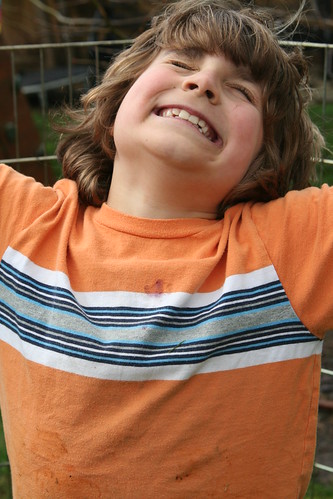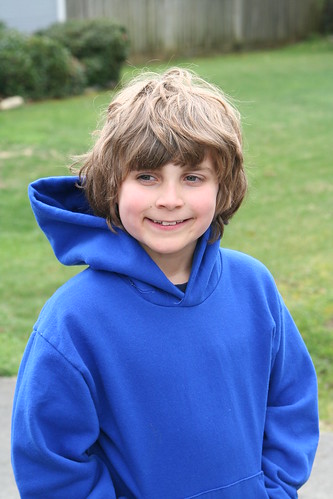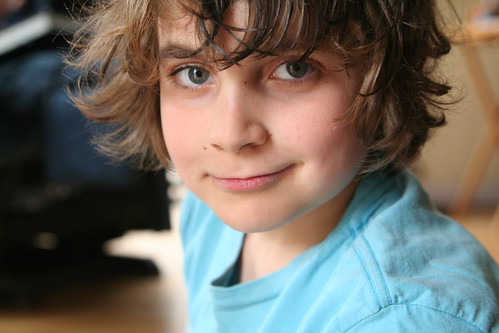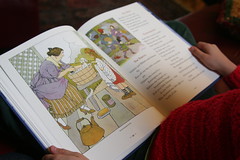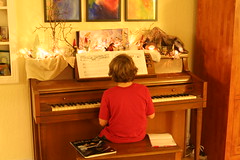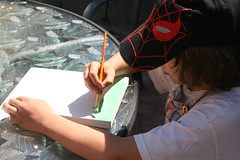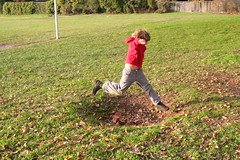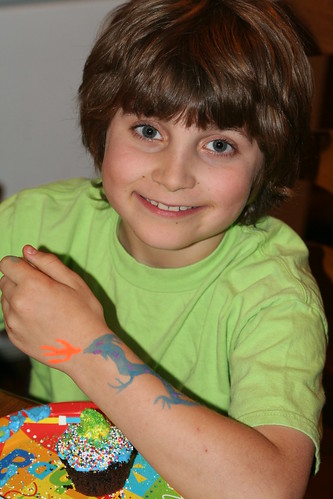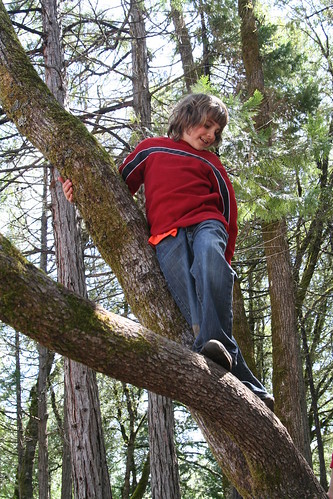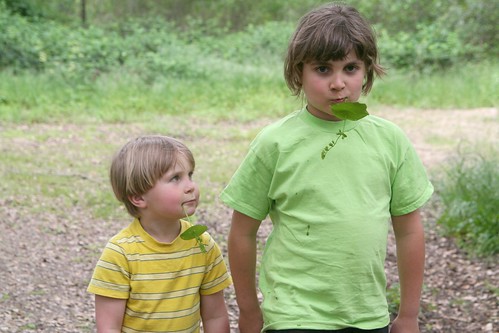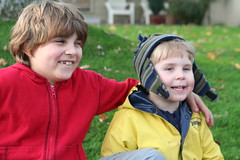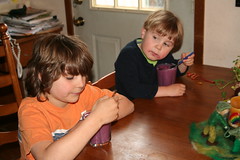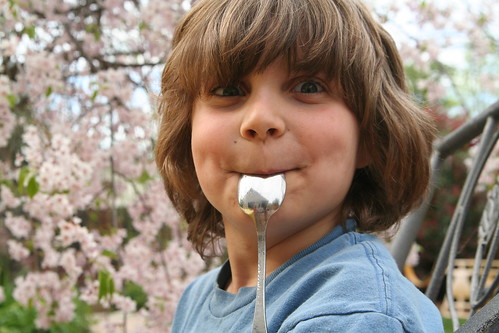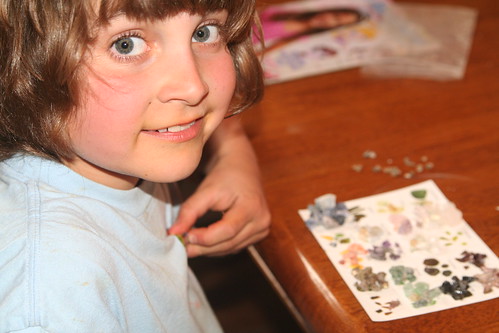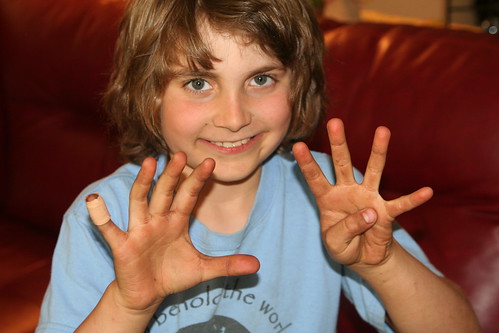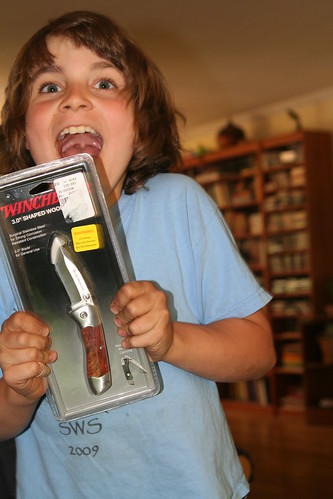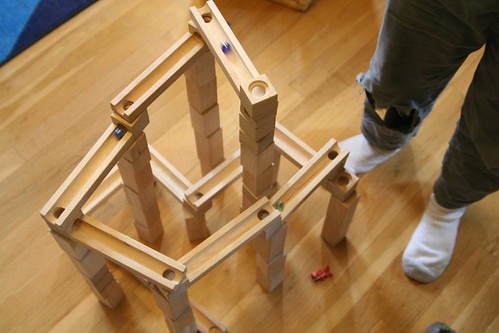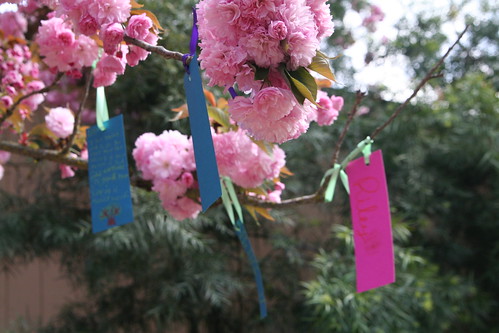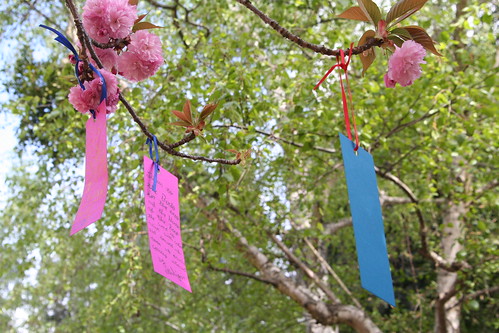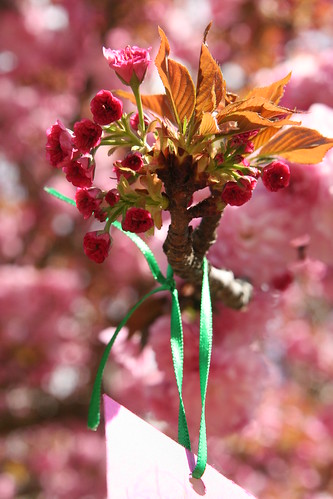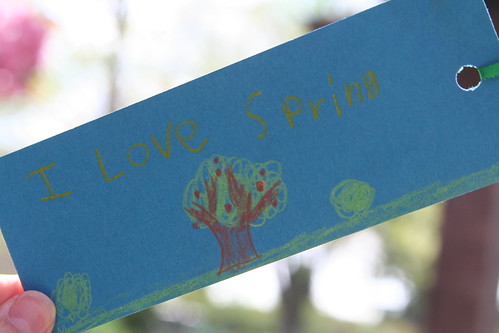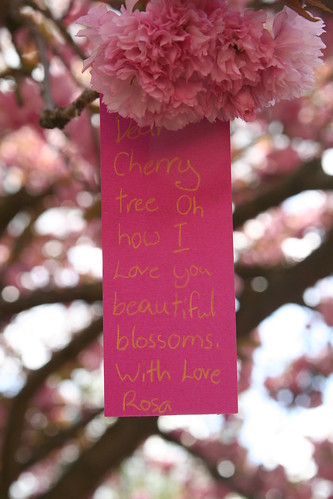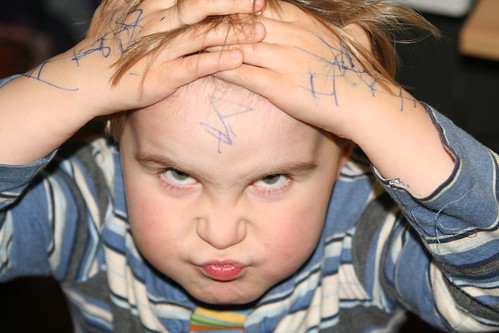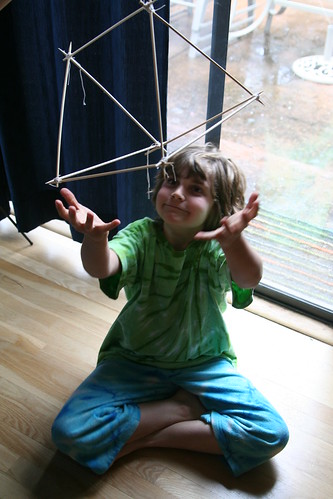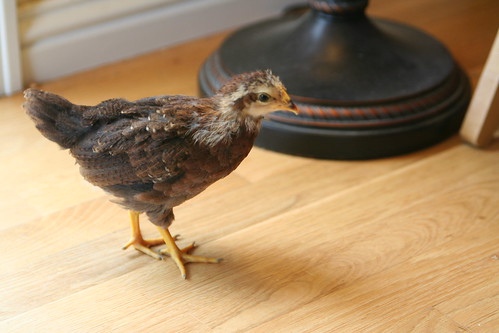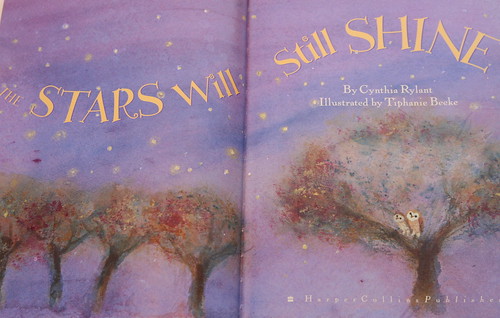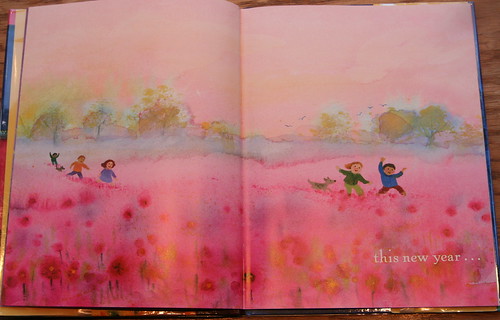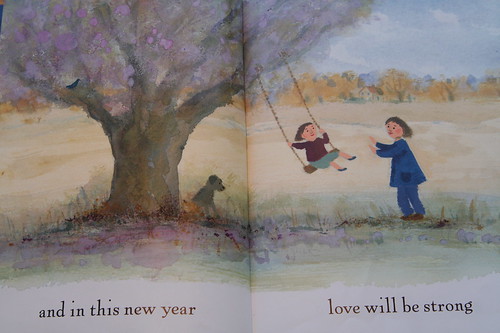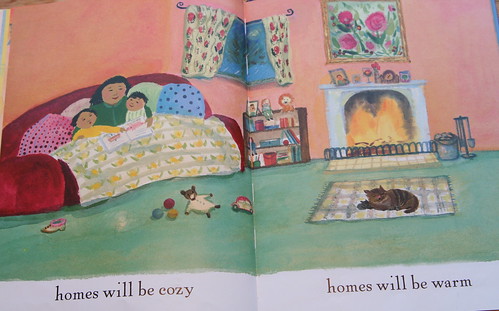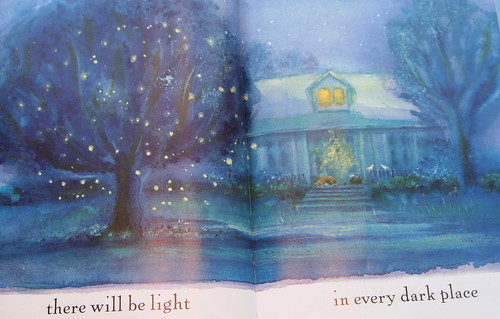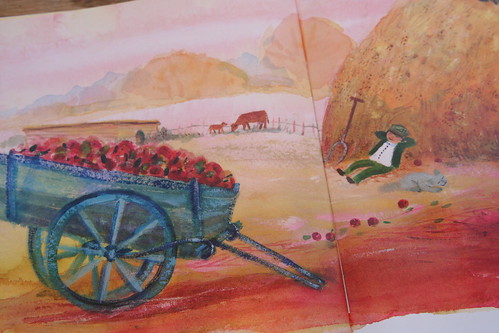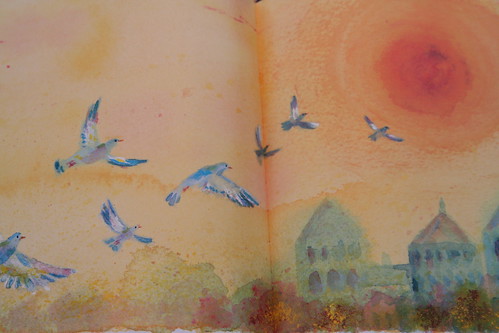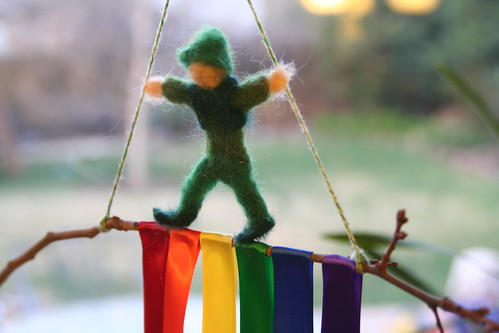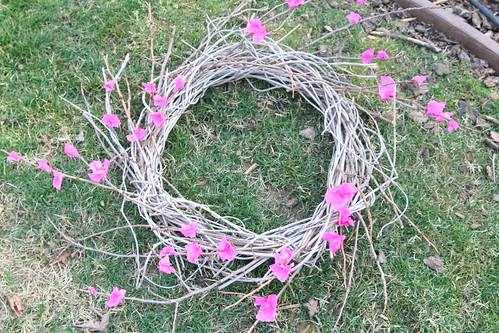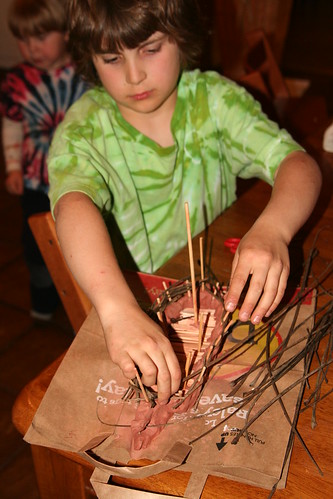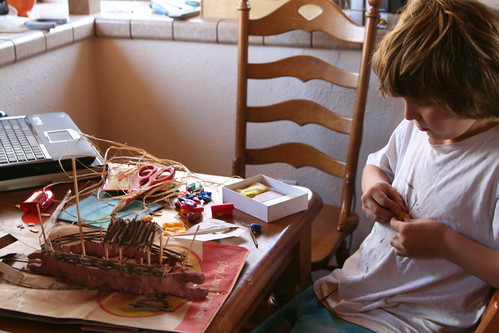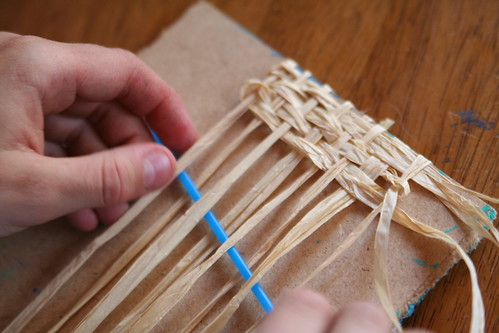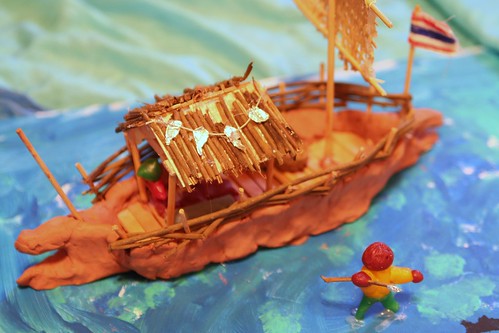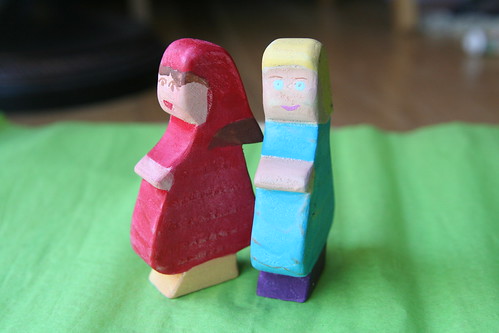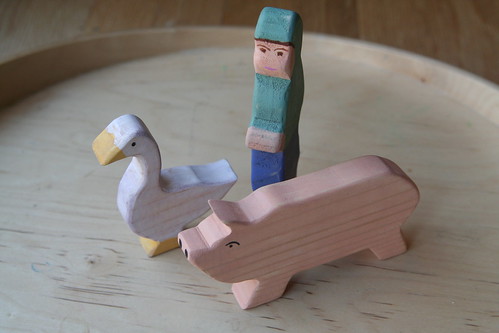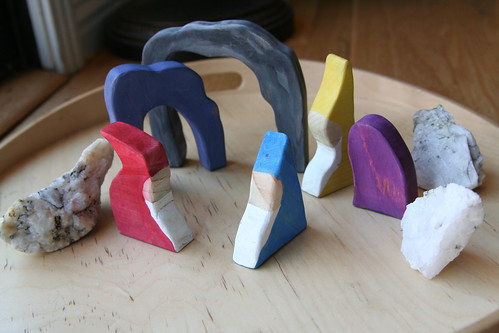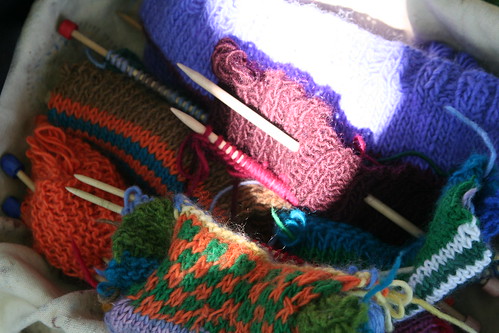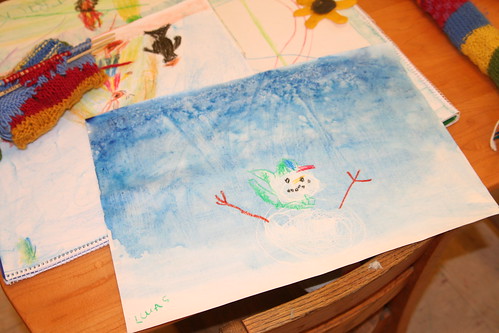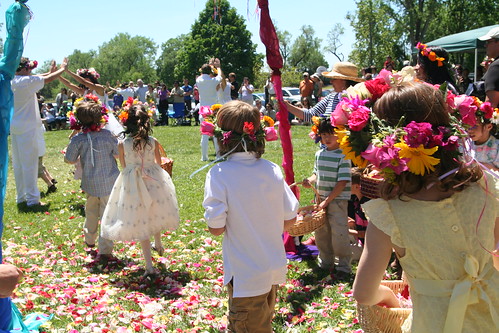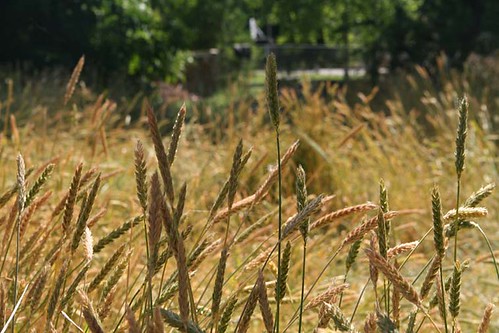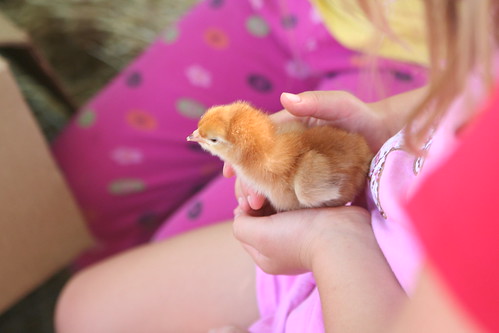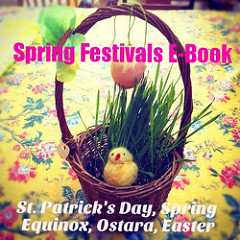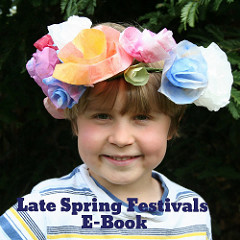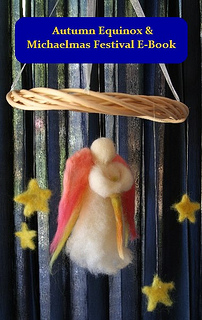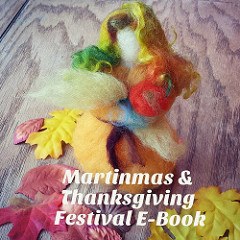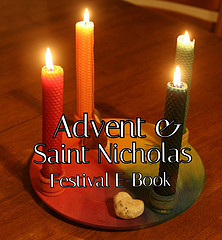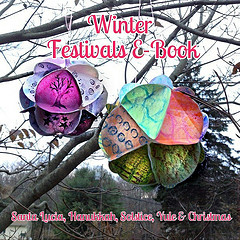Birthday Letter to Lucas
April 29, 2011
Dear Lucas,
It’s practically the eve of your 9th birthday. Tomorrow we will spend much of the day cleaning our home, baking, and decorating to get ready for your birthday party—your first-ever slumber party. It will be a busy day, and not all fun stuff. Together we will succeed in making the space ready for five of your dear friends.
This year, you have asked for a homemade apple pie instead of a birthday cake. I am surprised by this; somehow it seems too much like me and my preferences for it to be your wish. So often I see our differences and dissimilarities most clearly. But there are moments when I see myself in you, like when you get nervous before a big event and begin to wish you could be elsewhere, or like when you pore over a new book, exploring it with your hands and running its cover against your cheek, or like when you express your outrage when someone acts in a way that hurts you, accidentally or not. All of these characteristics in you remind me of myself.
I have seen you grow so much this year it boggles my mind. (I suppose I say that in every birthday letter I write to you. It is always true.) In the last year, I have seen you learn how to read music (both treble clef and base). I have listened with eager ears as you have learned to play songs on our piano, sometimes struggling, sometimes leaping forward in great ah-ha moments of inspiration. Your fingers are at home on the keys; your ear is better than mine ever was, and you seem to memorize songs after hearing them only a few times. This is both a tremendous asset, and also a liability because you are capable of skating along at times, not having to pay attention to the notes on the page. But I understand. It’s a foreign written language, and it’s so much easier for you just to remember all the sounds. You are getting better at paying attention and focusing on the music. You don’t like to work at it, and yet, when you master the task, it’s clear that you feel very proud of yourself. You have tackled some tough songs this year, including one called “Hogwarts March,” from a Harry Potter movie. I am pleased to see you working hard at piano—I mean, of course I want it to be enjoyable for you. I also want you to learn how to go after something you want, try and try and try, and earn your reward. You have been playing for a year now. You have said at times you want to quit, but then you seem to buckle down and achieve the next goal, which fills you up and readies you for more. I’m not inclined to let you quit because you’re good at it.
Another skill that seems to have ballooned is your reading. This gives your father and me so much joy we’re filled to bursting. You are unlocking the greatest thing ever, word by word, book by book, and you seem to know it. You say, “I’d rather read the book first before I see the movie.” You and your school friends discuss books! You come home with requests because so-and-so said such-and-such book was the greatest book ever. You know what ragged right means. You want books because they’re funny, or a bit creepy, or mysterious, or clever, or long and with sequels. And I am in heaven.
Still, I hold back a bit. I don’t push books on you because my showing too much enthusiasm for a story can ruin it. Secretly, I buy books for you all the time, and store them so that at the perfect moment I can give you one as a special gift, or just a now-you’re-ready-for-this surprise. It makes me feel like Santa Claus, and each time you unwrap one or I pull one off the top shelf, I hold my breath. Will you feel the same draw, the same magic as I do? I long to share this feeling with you, to have this one thing at least tie us together in companionship our whole lives. But even more fervently I wish that you will fall in love again and again with reading.
Reading is a big part of third grade, as are spelling tests. You have been bringing fourteen spelling words home to study most weeks this year. When we all remember to work on them together, you tend to ace the quizzes. I’m finding it’s surprisingly tricky to encourage you to care about whether you do well. Often you do, so that’s great. But not always. So we are all learning to negotiate new concepts of expectation. We parents are learning how to negotiate new concepts of parenting. Because you go to Waldorf school, you haven’t been struggling with homework for years already, for which I am grateful. We are not in the habit of having to work on school tasks at home. See? The spelling words are our mutual training ground. Not only do you have to get into the habit of doing schoolwork, but we have to get into the habit of helping you develop good habits! (That teacher of yours is quite clever.) I admit we have a ways to go in this area. Next year, you will have homework to do regularly.
***
May 1, 2011
You remain, as ever, exceptionally creative. Perhaps the best part of this characteristic is that you aren’t afraid of it. You go with your creative impulses without hesitation. I see this in your engineering of objects, in your drawings and paintings, in your imaginative play. There is nothing too big, too hard, or too wild for you. You also seem to seek out the different path. The Moken Kabong shelter project was a good example. You were tasked to build a human shelter model based the shelter of a genuine people. You were the only child in the class to build a boat shelter. While belonging is important to you, you take your individuality seriously. I really like that about you.
You love dragons and ninjas, secret agents and explorers. You love science perhaps more than anything. You want to be a Mythbuster or a chemist or a doctor when you grow up. Something sciency, no doubt. Sometimes you say you want to be a veterinarian.
You are fond of games now, especially complex ones with many rules. You are becoming a good chess player, playing sometimes with adults. I need to remember that you need opportunities to play games. Since gaming isn’t my favorite way of spending time, I need to hook you up with others who do enjoy games. Fortunately, we have a lot of friends who enjoy such things. And your dad is a great sport about this stuff; he’s always ready for a game of chess or whatever.
You invent plenty of games, too, creating cards with creatures that have magical and elemental powers. You talk of hit points, damage, spells, and +4 strength, +1 armor. The games are not confined to paper, though, for your creatures ride on your shoulders and you can fling them into battle, with sound effects and physical confrontation. Asher is a willing participant in all your fantasy worlds. Since you answer his every question about the game with complete confidence, he is content to play by your rules most of the time. Just don’t tell him he has lost all of his powers! On a recent car ride, you and Asher played a verbal quest game like Dungeons and Dragons—I think you called it Tentacle—where you were the GM and Asher had to make choices in his quest. Sometimes his choice was wise and he was rewarded by leveling up. Other times he was penalized, like when he fought and killed a good luck dragon. I suppose you have played this with your friends at school, but I was amazed at how engrossed the two of you became in the game. You were both thinking on your feet, so to speak, and it was awesome.
You (perhaps with friends) have invented a martial art, formerly called Twidlywinkies but recently redubbed “Hai-ya!” The first iteration of this martial art has been around a year or two, but you’ve recently been training your brother in Hai-ya. You are taking him through the ranks, awarding him new belt colors (playsilks) when he does well. Rainbow belt is the highest achievement, after black belt. There are five styles of Hai-ya, from what I’ve gathered: Dragon, Crane, Tiger, Panda, and Snake, which you conveniently swiped from the Kung Fu Panda movie. You say you are training several school friends, too. You would dearly like to take martial arts classes, and we may be coming to that sometime this year. The discipline you would learn in such a class would do you good, I think.
You enjoy shooting hoops, walking on your stilts, and riding your scooter and your bike. We have been letting you ride around the neighborhood alone a bit. Recently you rode off to the local park for a solo adventure. You love to climb trees and every time we go to pick up Asher from preschool, you shimmy up Ms. Pati’s grapefruit tree. Daddy has seen you climbing up our redwoods in our backyard, which are a bit too little still, I think. Now you can do the monkey bars! (You tried for a long time without success, so this is a big accomplishment.) So far, you aren’t interested in playing organized sports. You lament about not having enough free time, though your time is mostly your own. Filling it with sports practice I think would be odious to you. I wonder if and when you will ask for this, and if it’s our fault that you show so little interest in sports. Have we raised you to be just like us?
Overall, I have to say this last year has been much easier than previous ones. You are not as challenging as you used to be, or perhaps I should say, you aren’t challenging as much of the time. You seem in some ways less spiky than before, and are quick to show affection. You give compliments pretty freely, which is a delight. You often tell me and Dad that we are “the best parents ever.” Usually, when we are frustrated with you, it is because you are frustrated with your brother and are fighting with him. You and Asher provoke each other like crazy. You react to him as if every little thing was the most horrific offense, which naturally feeds the fire. You give him such delicious rewards for bugging you, so he does it as often as possible. We are trying to teach you to disengage, walk away, and ignore it when Asher needles you. I fear your choleric personality is a big obstacle. But siblings fight. Brothers fight. And Asher now is a force to be reckoned with.
But I have to also say how much love and devotion I see in your relationship with your brother. Asher looks to you for leadership, for courage, and for a role model. He would like to do everything you do and tries hard. You two are thick as thieves, as they say, completely intertwined with one another. You are best friends and worst enemies, as the cliché goes. You hate to be apart from one another, long to be together, and yet when you are, there is a maddening pattern of good, beneficial play and then angry bashing. We roller-coaster through our days like this and it drives us bananas. You are like powerful magnets, drawn together and compelled to play out dramatic hurts, betrayals, forgiveness, and camaraderie again and again, from dawn until sleep. It is difficult to live with, but I think it’s good relationship training. You are learning trust, how to negotiate, what consequences come from acting badly toward someone, how to forgive and be forgiven.
Sometimes you ask to have your own room again, and I feel bad that I took over your old bedroom for my office. I know sometimes you would really like to get away from Asher and have some private space. You are coping as best you can: You have claimed three personal “desks” in the house as your private places. You and Asher still sleep together sometimes, though, so it cannot be so bad.
A few months ago, you went through a rough patch and were feeling quite depressed and maudlin. You would sometimes get upset and say things like, “I shouldn’t even exist. I don’t deserve to live.” We tried hard to hold you safe and let you feel all your feelings. This “9-year change” business is hard, and dramatic. You seem to need us to acknowledge your pain, but also to act confidently through it. We don’t spend much time trying to convince you to feel differently, for that way is useless and also gives too much attention to the theatrics. We just hold the space in which you can (safely) suffer and try to show you that the suffering is temporary and that we love you despite it. I don’t know what more is in store for us in this changing stage. You’ve just turned 9, so there may be more pitfalls to negotiate this year. But no matter: We love you always.
I admire the way you make friends, Lucas, and I must say, it seems to me you have made some good ones. Your school buddies are great kids, and you get along well even with those classmates who aren’t your best friends. You are especially good in one-on-one situations to my eye. I’m proud that you are considerate, that you remember your manners, and that you make friends with adults as easily as you make friends with kids. You are warm and open, eager to share your experiences and eager to learn from others. I am proud that my friends like having you along, that they tell me what a fun, clever, ingenious kid you are.
***
May 2, 2011
The party is done now. It was a rollicking good time; “best birthday party ever,” you said. There were balloon fights and stick fights and spy-on-the-parents secret agent games. We watched “Mythbusters,” we ate Daddy’s marvelous hamburgers and you and your friends devoured a whole watermelon in mere minutes. You and your buddies stayed awake until midnight.
We were all pretty wiped out by the next day, your actual birthday, so we spent a kind of low-key day, enjoying each other’s company, and opening presents from me, Dad, and Asher. You are thrilled that we gave you your own, first pocket knife and have kept it with you every waking hour since then. We expect every stick within a two-block radius to be whittled by you in the coming months. You have already carved for yourself and your brother new wands, with which to have magical duels. Daddy was certain that you are ready for this; it’s a big responsibility to own and use a knife. We trust that you will take it seriously, and not use it recklessly.
We spent the evening of your birthday at Papa and Grandma Syd’s house. You begged to go swimming—the water was 62 degrees—and we let you. You proudly showed Papa your new pocket knife and he admired it. At the moment you’re enjoying time with VoVo and Aunt Kellie and you’re probably receiving more gifts.
There is no question about it, Lucas. You are beloved. Lucas, you are such a mysterious treasure to me and your dad, and every moment we find ourselves having to stretch and grow alongside you, just to keep up. You are delightful and warm, courageous and sensitive, and oh-so smart. You are our shining sun, our inspiration, and our initiator, for without you we wouldn’t be who we are today. We love you for everything that you are and everything that you are becoming. Happy birthday, my dearest light.
Love,
Mama
